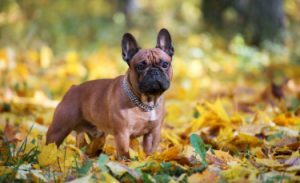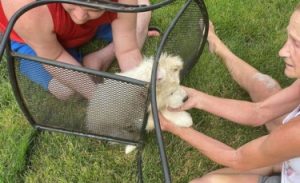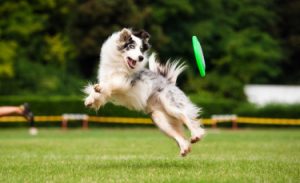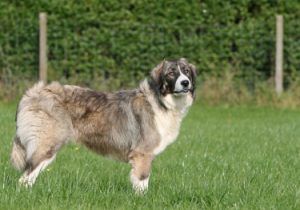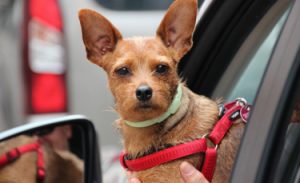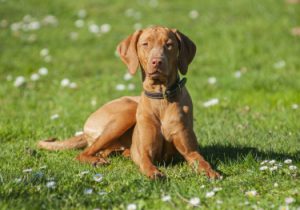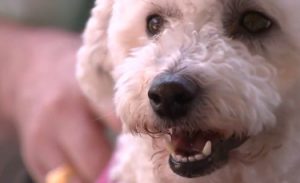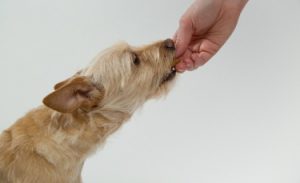Other names: Chin, Japanese Chin
The Japanese Spaniel is a sturdy, stocky, graceful and elegant little dog. His figure, his broad face, his rounded forehead and his long coat make him resemble the Pekingese.
<!–
–>
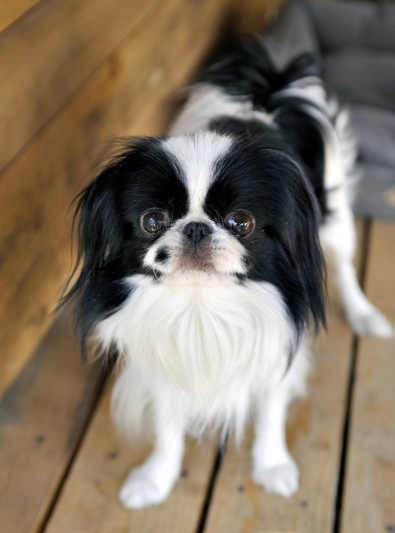
| Long | |
| Japan | |
| Small | |
| Round |
| Sex | Weight | Cut |
|---|---|---|
| Female | From 2 kg to 6 kg | From 25 cm to 29 cm |
| Male | From 2 kg to 6 kg | From 25 cm to 29 cm |
History of the breed
If he is called the Japanese Spaniel, this dog does not draw its origins deep in the land of the Rising Sun, but rather on the side of Korea. It would seem, in fact, that his ancestors were offered by the Koreans to the Japanese imperial court in the course of the 8th century. In the process, many other representatives of the breed arrived in Japan. Others have also been imported into China. Towards the end of the 17th century, the Japanese Spaniel was Shogun Tsunayoshi’s favorite dog.
The breed’s introduction to England dates back to the year 1613. It was Captain Searles who first brought it to Britain. The dog then met with great success there, especially with the ladies of British high society. The breed of the Japanese Spaniel was definitively recognized by the FCI on December 2, 1957.
Japanese Spaniel Pictures


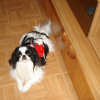
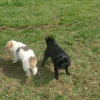
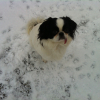

See all Japanese Spaniel photos of Woopets members
Physical features
His hair: long, straight, silky, abundantly covering the whole body except the face.
Its color: white with black or red markings. These are arranged symmetrically around the eyes, on the ears and on the rest of the body. The large white mark on the forehead is sought after.
His head: broad, rounded, with a rounded forehead and a deep depression with regard to the stop sign. The muzzle is very short and wide.
His ears: triangular in shape, long, wide apart, drooping and furnished with long hairs.
His eyes: shiny black in color, round in shape, large and wide apart.
Its body: the height at the withers is the same as the length of the body, except in bitches which have a slightly longer body. The back is short and straight, the lumbar region broad and slightly rounded, the chest moderately broad and sloping.
Its tail: abundantly and elegantly furnished with long hairs, carried on the back.
Behavior and character
| Affectionate | |
|---|---|
| Calm | |
| Protective | |
| Independent | |
| Hunter | |
| Barks / howls |
Behavior with others
| Cohabitation with children | |
|---|---|
| Sociable with other animals | |
| Love strangers |
The Japanese Spaniel is an alert , loyal, extremely affectionate and very gentle dog. Receptive and attached to his master, he is much more suspicious of strangers. However, he is not a big barker and his discretion is particularly appreciated. All of these characteristics make the Japanese Spaniel an excellent, mostly indoor companion dog. As for its physical qualities and its elegant appearance, they allow it to shine at competitions and dog shows.
The Japanese Spaniel
is it right for you? Take the test!
Education
| Clever | |
|---|---|
| Obedient |
Intelligent and attentive to his master, the Japanese Spaniel needs an education marked by gentleness and patience. Games are the best assets in learning the rules to follow and positive behaviors to adopt. Nonetheless, as a first dog it can be difficult for novices to train . You have to know how to be patient and persevering.
Living conditions
| Suitable for apartment living | |
|---|---|
| Good for new masters | |
| Love it hot | |
| Love the cold |
The Japanese Spaniel is essentially an indoor dog . Living in an apartment suits him best. The possibility of evolving on a fenced garden would not displease him either. He just needs to be able to receive affection and attention from him. He doesn’t like loneliness at all .
Health
| Solid | |
|---|---|
| Ease of gaining weight |
The Japanese Spaniel is a dog that lives a long time, but whose health can be exposed to certain ailments, some of which are inherent to genetic predispositions . He can, among other things, suffer from cardio-respiratory, ear and eye diseases . In addition, the Japanese Spaniel fears strong heat .
Hypoallergenic breed
No
Litter size
Between 1 and 3 puppies
To protect you from these risks and insure your companion in the event of health problems, Woopets recommends Japanese Spaniel dog insurance .

function showAssuranceForm () {var siteReferer = var id_race_association = ‘123’; //console.log(id_race_association);success: function (html) {}});}document.addEventListener (‘DOMContentLoaded’, () => {$ (‘# assuranceModalBanner’). on (‘show.bs.modal’, function (event) {showAssuranceForm ();});});
Life expectancy
Minimum: 12 years old
Maximum: 14 years
The life expectancy of a Japanese Spaniel is, on average, between 12 years and 14 years.
Calculate the human age of your Japanese Spaniel!
To choose… 1 year 2 years 3 years Four years 5 years 6 years 7 years 8 years 9 years 10 years 11 years old 12 years 13 years 14 years old 15 years old 16 years old 17 years 18 years old 19 years old 20 years 21 years old
Maintenance and hygiene
| Ease of maintenance | |
|---|---|
| Cost of maintenance | |
| Hair loss |
| Drool level | |
|---|---|
| Ease of grooming |
The Japanese Spaniel tends to lose a lot of hair during the moulting period . The rest of the year, it only requires regular maintenance to keep its dress nice and clean.
It is recommended to brush the dog several times a week , every day during the moulting period. It is not necessary to groom it, unless it is a subject intended for display. On the other hand, it is important to regularly clean your large eyes and floppy ears to avoid debris, secretions and prevent ailments.
Price and budget
Purchase price
Mini
Max € 500
700 €
The purchase price of a Japanese Spaniel is between 500 € and 700 €.
Annual maintenance cost
Mini
NC Maxi
NC
The annual maintenance cost of a Japanese Spaniel is between NC and NC.
No name is currently proposed. Use our tool to find the name of your Japanese Spaniel!
Want the best for your dog?
Create tailor-made food for your Japanese Spaniel
I discover !
PROMO -30% | Delivered to you!

Physical activity
| Athletic | |
|---|---|
| Energy level | |
| Potential to play |
He enjoys playing and walking around, but he is not particularly keen on exercise . A good daily outing is enough to allow him to stretch his legs, to discover his environment and to get some fresh air.
Others
| Master character <span class="btnTooltip qTip2" title="- Calm: the master must be gentle and know how to show patience. – Active: the owner must be energetic and dynamic to live in harmony with his dog. – Hyperactive: the owner must be stimulating and very restless to suit the temperament of his dog.”> |
Calm |
|---|
We talk on the forum
A Japanese spitz is good for children from 10 to 12 years old
Guest message
Japanese spitz x shiba inu
Message from Ange Lottier
Japanese Spitz: Cage and playpen size
Message from Nicolas Gay
SAM, Brittany spaniel in danger of death in beziers, urgent !!!!!!!!!!!!!
Guest message
My spaniel spends the day with his nose in the snow.
Guest message
Do you have a question about the Japanese Spaniel?
Do not hesitate to ask Woopets visitors for advice on the forum!
FCI Information
FCI No.
206
FCI Group
Group 9: Companion and Toy Dogs
Recognized by FCI
Since 1957
</div


